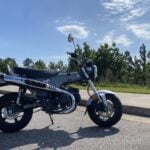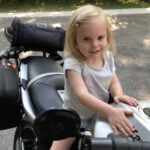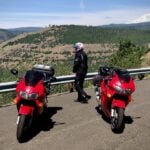Neale Bayly Rides Deeper Into War-Torn Ukraine
As we loaded our bikes and got ready to leave our hotel in Lviv, the Loft 7, the front desk team came out to say goodbye. After seeing a couple of hairy Englishmen running in and out the last few days they had become very connected to us, and it was funny how life at the hotel had so quickly become the new normal. Breakfast with the secretive ex-military South African, who always sat in the same seat, rolling over and sleeping through air-strike warnings, and wishing my youngest son was smart enough to come and meet the lovely young front desk ladies who were waving us goodbye.
It was one of those times where the historic streets, the beautiful weather and stunning architecture had me fooled into thinking I was on tour taking in the sights, sounds and smells of a beautiful new country. The feeling continued out into the countryside as we rolled for Kyiv with fields of grain and sunflowers, small rural villages, ornate churches and cathedrals dotting the landscape. Andriy, our fixer, had the Olesko Castle lined up to visit and photograph and the day was idyllic. We filmed some ride footage, stopped for a sandwich, coffee and occasional photo op, and it was as peaceful and enjoyable as a day in the saddle could be.
A beautiful country, away from the war.
In total it’s only around 350 miles, so not a marathon day in saddle, but on two-lane roads and constantly slowing or stopping for military check points it was late afternoon as we hit the outskirts of Kyiv. Where our exposure to the war had been from the testimonies of amputees, refugees, and air strike warnings, within minutes of arriving the sights and smells of blown up buildings had my head on a swivel. Whole shopping malls, department stores, gas stations and houses were gone, leaving just charred, twisted remains as grotesque reminders of the death and destruction caused by Russian missiles. Closer into the city as the sun was setting there was less damage and we rolled through historic tree lined avenues to find our funky accommodation, as if I were pulling up to my hostel on my old motorcycle in Istanbul riding in Europe thirty years ago.
Setting up camp for a few days in our small, single bedroom apartments, Kiran and I debriefed from the day, both sharing the insane feeling of catching ourselves enjoying the ride and forgetting the war for a while. Any feelings of guilt were soon washed away by the haunting and now familiar sound of the sirens howling out into the night, as we sat discussing our day and the strange intimacy that knowing these could be our last moments induced.
Father Makariy with Miroslava, a refugee with her mother from Kharkiv, both of whom are sheltering in the Monastery under the Abbot’s care. Currently housing many fleeing the carnage, he is emulating the work of his predecessors who protected Jewish children in WWII during the Holocaust.
Morning saw us rested, drinking coffee in a little shop along from our flats and Andriy bouncing in to give us our daily ration of shit for being old, ugly and English. With so much in the news about Bucha and Irpin, after the discovery of the mass graves, we decided to head in that direction first and saddled up. Riding past the destroyed infrastructure as life continued was a mental dichotomy that is still hard to process. My other experiences of war had not revealed so much physical destruction and my mind was still trying to figure it out as Kiran motioned to pull over. He had found some ladies selling flowers beside the road and wanted to make some images.
Traveling with an award-winning photographer I had the pleasure, and privilege, to watch him work at very close quarters. And, while I sort of add “photographer” to my title, in this sort of company I really should remove it. During my career the photographs I have brought back are just recording of what’s there. Kiran’s are different, as he has a distinct idea of what he wants to achieve with his images and goes after it. It’s fascinating to watch his process, his patience and how long he works a subject, just shooting away to get the perfect moment he is looking for.
Kiran captured one of the flower ladies, portraying the indomitable spirit of the Ukrainian people.
Andriy is brilliant. He has such fantastic instincts and intuitions, and somehow before we know it he has plucked an 82 year old lady from her flower booth and we are touring her home in the nearby suburbs. One of the first to be hit with Russian missiles, lady luck was with her when the bomb that landed in their yard, bounced off a car and into the outside kitchen and bathroom, destroying both. If it had landed on the driveway the explosion would have killed her and her husband as they slept. Walking through her neighborhood in the tank tracks and looking at the partially destroyed houses, Kiran and I kept coming back to how random it always was. How one house was destroyed and another left untouched.
Closer to Bucha we stopped to observe a line of tanks and military vehicles that had been blown up in place by the Ukrainians. My thoughts leaning in the direction that they must have had extremely good intelligence to get them all in one go, as not one of the ten or more machines appeared to have tried to break formation. What was more shocking was watching people pull over for photos as they were passing and the realization how close the Russians got to Kyiv.
One of the many destroyed Russian tanks and armored vehicles we found along the roads, the Ukrainians dealing some payback for the invasion of their homeland.
Lady luck jumped in and Roman, a refugee from Irpin on a small Chinese motorcycle, was soon escorting us across Bucha with his friend on board a BMW F800GS. They were friends with the gentleman who runs the local motocross track and wanted us to meet him. Hit by dozens of missiles the devastation was heartbreaking, but as with every place we went to in Ukraine they had already filled in 47 bomb craters on the track, and cleared tons of debris.
The rest of the day was spent touring apartment complexes and private housing that had been destroyed and interviewing local people left living in the rubble. Some had evacuated and left, most had lost someone significant, and a lot of the men were away at the front lines leaving the women and children in the shattered remains of their once peaceful life. They kindly shared their stories, and as Kiran has repeated so many times on podcasts and TV shows, the motorcycles gave us fantastic access: and of course Andriy. I’ll never be able to convey the love and respect I feel for him, and how he translated and allowed us to get so close and go so deep with his people. He always felt it, he always lived it, and while we messed with each other like brothers out of sight, whenever we were working he was always totally invested in the moment, and we could not have had the experiences we were given without him.
A beautiful city, even on war footing.
We spent a few days in and out of the area, before a walking tour of Kyiv. What an incredible city it is, crammed full of amazing architecture, peaceful streets and avenues with sidewalk cafés, historic churches and cathedrals at every turn. My favorite was St. Sophia, founded in 1037 with monastic buildings, a gilt cupola, necropolis and museum. It also had a chilling exhibition outside its gates, of destroyed Russian military equipment, which really just shows so much the Ukrainian spirit of giving a middle finger to Russia. On a beautiful sunny day, tourists photographed and climbed on destroyed tanks and missile launchers as if it were just a normal event in a city center. I had one of my now fairly regular gut punches when Andriy translated the hand drawn signs taped to a shot-up and destroyed compact car: Children.
It’s impossible to put these feelings into words, as you try to imagine Russian soldiers taking aim and deliberately shooting and killing little children fleeing the bombs and missiles. And to allow myself to think we live here among Putin apologists could have sent me to some very dark places had Andriy not snapped me back with his usual “come on you old dick, let’s go find Kiran.” Thankfully he was finished and we went for lunch, and with the bizarre sensation of sitting in an English style pub, watching Formula One racing and listening to country music while eating Borscht some sort of emotional balance was achieved.
The devastation is heart-rending.
Our ride the following day to Odessa started late. Breakfast with a Ukrainian journalist got us up to speed on some of the areas we anticipated traveling, and with the grain blockades in full swing, and Odessa being hit with missiles, we rode with some apprehension this day. The ride was around three hundred miles, the roads were smooth, the countryside abundant with sunflowers for mile upon mile, and eventually we had to stop and take some photographs.
Entering Odessa in the early evening, this beautiful coastal town was eerily quiet. The military checkpoints were usually a good barometer of how “hot” a particular area was and the intense shakedowns told us all we needed to know. Dinner with a local named Yury, who is building and supplying motorcycles to the military as his usual Enduro business has been ended, was held in a quiet courtyard under the most intoxicating moon. As our South African friend in Lviv often said, “life in wartime.”
Daily cleanup amidst the evidence of combat. The spirit of these people will not be broken.
Late into the night we discussed our next move, which was to visit the city of Mykolaiv. This city was being hit constantly and if one of us decided we didn’t want to risk going in we all agreed we would abort. We also decided we needed to go in the car as it could get complicated with three vehicles. We set a crew call for 8.a.m and headed off to bed, a night of disrupted sleep from the omnipresent sirens not doing much to calm the nerves.
Being together in the car, making the journey out of Odessa our spirits were good. The city itself wasn’t showing a lot of signs of damage, and the countryside always felt safer and more peaceful. Then the checkpoints came, and then Mykolaiv, the long lines of people lined up queuing for water gave a sense of apprehension of what we were going to find.
A grieving heart, seen in those eyes. She would die within days, we later learned.
Omel was providing intel from Lviv and we learned a school and a hospital had been hit. Our first stop though was at an apartment complex that had missile strikes in the yard. Wiping out an old man called Ilia’s house and workshop, it had taken all the windows out of the apartments. With fires still burning, some people with bandages and blood stains moving slowly, I noticed an old lady staring through the shattered glass of her flat window. Instinctively I framed her against the broken backdrop, taking multiple pictures as she remained motionless. I was sadly not surprised to learn from her daughter a few days later that she had passed, as I felt looking intently at her through my lens she was already gone.
As we worked, emergency service workers were hard at the clean up and we stepped outside mesmerized by a beautiful young lady called Liebov, which means love in Ukrainian. As she picked through the ruins of her father’s house, she had rescued her baby clothes and was going to donate them to a local charity that was overwhelmed with children’s needs. It’s certainly helpful to have a camera to your face to cover your tears at these times.
Beautiful and determined Liebov, whose name means “love”, working through the ruins of her father’s house. She embodies the strength of her people.
Feeling like we didn’t want to get in the way of clean up, we moved across the city to visit the school. In some incredible stroke of luck the missile that struck had not exploded and that was almost as shocking as anything we had seen. The amount of damage it had done just landing was insane and mercifully there were no children present. Photographing the destroyed playground, the schoolrooms blown to bits with curtains blowing in the breeze the silence was oppressive as the cleanup crews hadn’t arrived and I was glad when we made a move. Or so I thought. Looking for the local hospital, we got stuck in a deadend street as the air strike warnings erupted across the city. With somewhere between 15-25 missile strikes already that day and the word “f*ck” erupting from Andriy’s lips over the siren’s call, the moment of real fear I had been anticipating for months was upon me and we had nowhere to go…
Neale
*Photos by Neale Bayly and Kiran Ridley

































This felt so real and unreal at the same time. How genuine suffering was mundane to a people, only one who journeyed into war can put into words. I hope you know how meaningful your work is. My salutations to you.
Thank you so much for your kind words. It certainly makes it seem more meaningful.
best
Neale
A powerful and moving perspective to remind us how Ukraine is fighting against all odds in defense of freedoms we take for granted here in the West.
Thank you and yes, Ukraine is fighting against massive odds. Hopefully we never take our freedoms for granted.
best
Neale